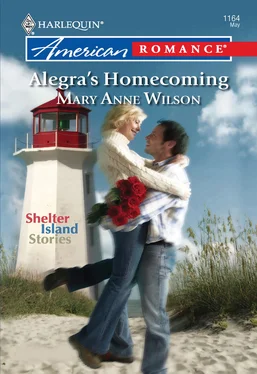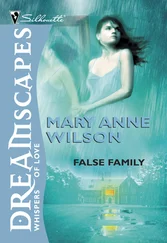Her tongue touched her pale pink lips, before she simply said, “Oh.”
“And you’re…?”
She stared at him, as if he was suddenly speaking a foreign language, then she swallowed and softly cleared her throat. “Alegra Reynolds.”
Joe had spotted her at the booth where the ferry tickets were bought before they’d boarded for the trip to the island. She’d stood out in the sea of commuters getting on the ferry’s last run before it shut down for the night. Her clothes had certainly made her conspicuous: the thigh-length jacket with what he’d guess was politically correct faux fur at the collar and cuffs, to the pencil-legged jeans, and the narrow high-heeled boots.
He’d watched her get her ticket, then climb into the car, a sleek black sedan, in front of his old truck. He’d guessed she was in her late twenties, with shoulder-length hair the color of rich cream, and a profile that hinted at a delicate beauty he wouldn’t have minded seeing full face. But she was in the car with its tinted windows, and out of sight by the time the ferry started loading.
He’d been behind her on the deck, letting the truck idle to keep the heater going, and watched her exit her car. No islander would leave the comfort of his or her vehicle to stand at the rail and stare out at the dark waters of the sound. He’d watched her until she disappeared, then decided to go belowdecks to the small concession for some hot coffee.
He’d been up since four that morning, taking the earliest ferry to Seattle, and he was starting to feel the effects of a long day in the city. But before he’d reached the stairs that led belowdecks, he’d passed the woman and heard her mutter, “Damn it all,” in a choked voice. He’d turned and she was there, looking decidedly green around the gills. He hadn’t thought twice about going closer and asking her if she was okay.
Now he was standing facing her, seeing she was as beautiful as he’d thought she was. Alegra Reynolds. The name rang a bell, but before he could get a handle on where he’d heard it, her cell phone rang again.
After reading the LED screen, she answered it. As he turned to look past them at the dock coming closer and closer, he heard her say, “What now, Roz?” Then a long silence before he heard, “Do it. Let me know when the tax attorney gets back to you.” As he glanced back at her, he saw her end the call, but still keep the phone in her hand. “Business,” she said.
“I assumed as much. ‘Tax attorney’ doesn’t usually come up in everyday conversations with friends and family.”
She smiled softly, another expression that was so damned endearing it made his breath catch. “No, it doesn’t,” she said. “You lived here before and then came back?”
He nodded. “Right.”
“You commute to work now?”
Despite her blush when he’d told her his name, she apparently didn’t have a clue who Joseph Lawrence was. “No, I work on the island. I’m a writer for the newspaper, the Beacon—it’s a small weekly for the island. We cover big stories like announcing the best peach preserves and counting the times the local drunk is locked up.”
A spasm crossed her face and he was certain she was going to be sick, but she only exhaled. “You’re a reporter for the paper?” she asked.
He nodded. “A reporter and the owner.”
He could tell that surprised her. “Really?”
“That’s what it says on the flag, owner and editor, at least it has for the past six months. The previous owner, Clive Orr, retired to Florida to sun and fun.”
“Smart man,” she murmured as the wind picked up, bringing cutting cold with it.
When her phone rang again, he heard himself asking, “Does it ever stop?”
She took the device out, saw the LED and hit a button that shut off the ring. “When I turn it off.” She kept it in one hand, and tried futilely to get her hair under control and behind her ears. “It’s business. You know how that is.”
He had a flashback to his other life, before he came home to Shelter Island. Back then cell phones had been his lifelines. Heck, he’d had three. One for business. One for personal calls. And one with a number he only gave a select few. He’d had an earpiece he never took out of his ear while he was awake. Now he still had a cell phone, but seldom turned it on, and truthfully wasn’t at all sure where it was right now. “It can eat up your life, can’t it?” he said.
She took him off guard when she asked, “Why did you leave the island?”
He shrugged. “You know, the old I’m-going-to-conquer-the-world attitude?”
“And you didn’t?”
“I got close, then came back here,” he said, not about to go into details of the twenty years he’d lived away from the island, or why he’d come back here six months ago with his three-year-old son, Alex, to make a life for the two of them where his own had begun.
The ferry slowed even more, and an announcement came over the loudspeaker. “Sorry, folks, we’ve got a bit of a problem docking, and it’ll take a few minutes.”
“Riding the ferry can be an adventure,” he said as the big vessel lurched to a complete stop.
Alegra grabbed the railing to brace herself. “This could be a huge story for your paper,” she said.
“I guess so,” he said, aware of more than a hint of sarcasm in her tone. It hit a nerve. “Not like gang shootings or bodies in the Hudson, though.”
That made her smile. “Yeah, not exactly the big, bad city.”
“Alegra Reynolds. You’re from New York.”
It was a statement, not a question, and he could tell it surprised her. “Yes, but how—?”
“The boutique. The one near downtown Manhattan. All black and silver, with headless mannequins in the windows?” He’d gone past that upscale store when he’d walked to work instead of taking a cab. He’d glanced at it more then once, and wondered how anyone could call those tiny pieces of silk and lace clothing. “You’re that Alegra.”
She looked pleased that he knew of her. “You got it right, but how could you?”
“In my other life, I worked at one of the big New York dailies, and our offices were about two blocks south of where your store is. I went past it a lot.”
Her smile slipped, and her mouth formed a perfect O before she finally said, “J. P. Lawrence? You’re that Lawrence?”
He nodded. “Used to be.”
“But now you’re here?” She waved vaguely to the island nearby.
“Yeah, I’m here.”
“But you…” She bit her lip, looking as if he’d said he was from Pluto but chose to live on Mars. She looked stunned. “You were the editor, weren’t you?”
The ferry lurched forward again and the voice came over the speaker. “We’ll be docking in five minutes. Please be ready to disembark.”
“We need to go to our cars.”
It was as if he hadn’t spoken. “What are you doing here running a weekly newspaper?”
So many had asked him that, and so many had gotten his stock answer. “I’m here for my son, to let him grow up where I did.” But a part of him wanted to tell her something that was more truthful than the first statement. “I told you I went off to conquer the world, but what I didn’t say was, it wasn’t worth it.”
She stared at him, then a frown grew. “Oh,” she said. “I understand.”
“What do you understand?”
“Nothing, I’m sure it’s personal. Things happen, and—”
“Oh, no, I wasn’t a drunk or druggie and lost it all. No.” He stood straighter. “I didn’t have a breakdown or punch the publisher in the face.”
She held up both hands, palms out to him, shaking her head. “No, I didn’t mean that.”
He looked at her hands, the long, slender fingers, and realized something. She wasn’t holding her phone any longer. He didn’t remember her putting it in her pocket, either, though maybe she had. “Your phone?” he asked.
Читать дальше












